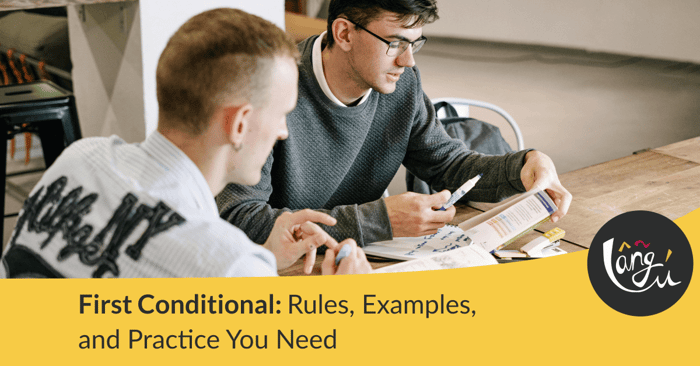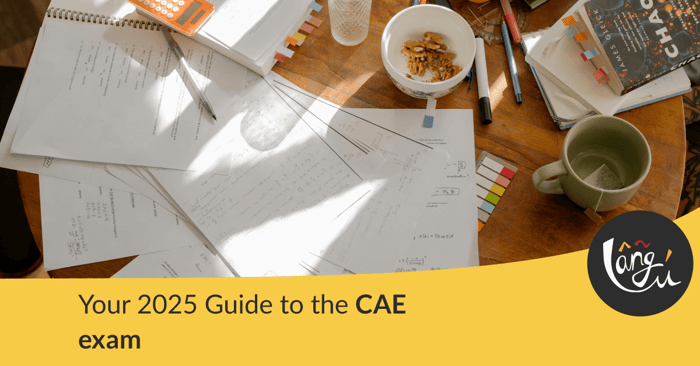Table of Contents
- What Is the First Conditional?
- First Conditional vs Other Conditionals
- How to Use the First Conditional: Rules and Tips
- Common First Conditional Mistakes
- When to Use the First Conditional
- Practice: First Conditional Exercises
- The use of 1st Conditional in Everyday English
- Summary: Master the First Conditional Now
- FAQs
The first conditional is one of the most useful structures in English. It helps you talk about real possibilities in the future—things that might happen if something else happens first.
In this guide, you’ll get a complete breakdown of how to use it correctly, see it in action with real-world examples, and test your understanding with practical exercises.
What Is the First Conditional?
The first conditional is used to talk about real and possible future situations. It describes something that could happen if a specific condition is met.
Basic Structure
If + present simple, will + base verb
Examples:
If it rains, we will stay home.
If you study, you will pass the test.
If she calls, I will answer.
This structure shows a cause and effect relationship between a possible future condition and a likely result.
First Conditional vs Other Conditionals
There are four main types of conditionals in English. The 1st conditional deals with real future possibilities. Here’s how it compares:
| Conditional | Structure | Use |
|---|---|---|
| Zero | If + present, present | General truths and facts |
| First | If + present, will | Real future possibilities |
| Second | If + past simple, would | Unreal, imaginary situations |
| Third | If + past perfect, would have | Past regrets or hypotheticals |
Remember: the first conditional is for things that are likely to happen if a condition is met. It’s not about dreams or hypotheticals—it’s about reality.
How to Use the First Conditional: Rules and Tips
Let’s break down the first conditional into its key components and rules.
1. Use Present Simple in the If-Clause
This surprises many learners. Even though you’re talking about the future, you use the present simple in the condition part.
Correct:
If you eat too much, you will feel sick.
Incorrect:
If you will eat too much, you will feel sick. ❌
2. Use "Will" for the Result Clause
The result is a future action or consequence, so we use will + base verb.
Examples:
If he finishes early, he will join us.
If they don’t leave now, they will miss the train.
3. Negative Form
You can make either part negative.
Examples:
If you don’t try, you won’t succeed.
If she calls, I won’t answer.
4. Question Form
You can also ask questions with the 1st conditional
Examples:
What will you do if it rains?
Will she come if you invite her?
Common First Conditional Mistakes
Avoid these frequent errors:
❌ Using "will" in both clauses
Wrong: If she will come, we will leave.
Right: If she comes, we will leave.
❌ Using present continuous or past tense
Wrong: If he was busy, he will call later.
Right: If he is busy, he will call later.
❌ Confusing with second conditional
Wrong: If I won the lottery, I will travel the world.
(That’s hypothetical → should be “would travel”)
Right: If I win the lottery, I will travel the world.
When to Use the First Conditional
Use the 1st conditional when:
You're talking about real future possibilities
The situation is likely or possible
You want to predict results of actions or decisions
Examples in Real Life:
If I get the job, I will move to Berlin.
If we leave now, we will catch the last bus.
If you don’t water the plants, they will die.
Practice: First Conditional Exercises
Try these examples to test your understanding. Fill in the blanks with the correct form.
Exercise 1: Complete the Sentences
If you __________ (not hurry), you __________ (miss) the train.
If they __________ (study) hard, they __________ (pass) the exam.
If it __________ (rain), we __________ (stay) inside.
If she __________ (call) me, I __________ (answer).
If we __________ (not book) a table, we __________ (not get) a seat.
Answers:
don’t hurry / will miss
study / will pass
rains / will stay
calls / will answer
don’t book / won’t get
The use of 1st Conditional in Everyday English
Using the 1st conditional makes your English more natural and fluent. Native speakers use it all the time to talk about decisions, plans, and consequences.
Examples in Conversation:
“If you’re free later, I’ll send you the link.”
“If they raise the price, I won’t buy it.”
“If we don’t leave now, we’ll be late.”
Start using these patterns in your own speaking and writing—they’re simple but powerful.
Summary: Master the First Conditional Now
The first conditional is a must-know structure for anyone learning English. It helps you express real future possibilities, make predictions, and understand consequences.
Remember the formula:
If + present simple, will + base verb
With enough practice, this pattern will become second nature.
Ready to Improve Your English Fast?
Understanding grammar is just the beginning. To truly master English, you need consistent practice and expert feedback.
👉 Book a 1-on-1 lesson with a professional English teacher at Langu. Get personalized guidance, real conversation practice, and instant correction to level up your English faster than ever.
FAQs
What is the first conditional in English grammar?
The first conditional is a sentence structure used to talk about real and possible situations in the future. It follows the pattern: If + present simple, will + base verb.
When do we use the first conditional?
We use the first conditional when we're talking about future situations that are likely to happen if a certain condition is met. For example: If it rains, we will stay home.
What is the structure of the first conditional?
The basic structure of the first conditional is:
If + present simple, will + base verb
Example: If she studies, she will pass the exam.
How can I practice the first conditional?
You can practice the first conditional by writing your own examples, completing fill-in-the-blank exercises, or using it in speaking. For personalized help, book a session with a teacher on Langu and get real-time correction and feedback.




